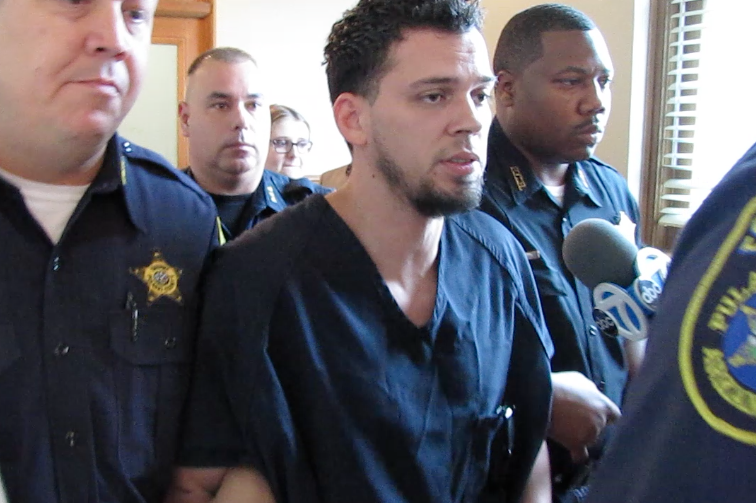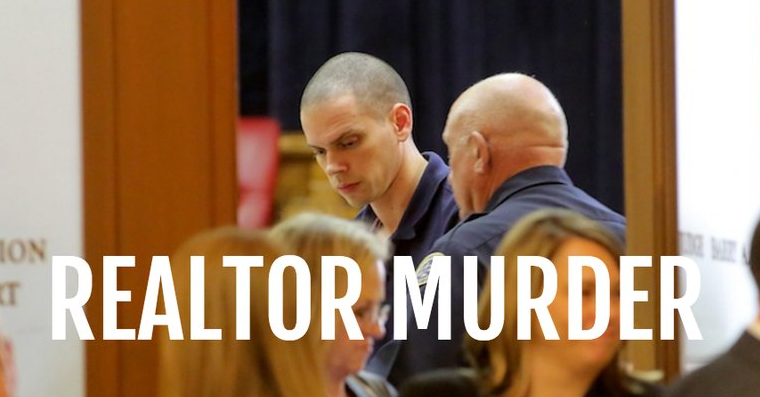The Jacksonville man accused with his wife of abducting and killing real estate agent Beverly Carter said information stored on his cellphone will clear him of wrongdoing, but he won't give the pass code to authorities because he can't trust they will preserve the evidence.
"That cellphone is my only hope of defense," Arron Michael Lewis told a judge at his fourth circuit court appearance. "It'll shed a whole new light on this."
The phone cannot be accessed without Lewis' pass code, prosecutors said.
"I'm never going to turn over the code to them or anyone," Lewis said.
Pulaski County Circuit Judge Herb Wright said he wouldn't order Lewis to surrender the code, but if Lewis doesn't reveal it, whatever is on the phone cannot be used at trial.
"If you keep the code to yourself, then that information won't be allowed in court," the judge said.
If he revealed the code, Lewis said, he wanted a neutral party to extract evidence, suggesting his wife's lawyers could do it.
The judge said that arrangement would not work because the extraction process would be conducted by examiners at the state Crime Laboratory, and even prosecutors would not be afforded the level of access to the evidence of which Lewis asked.
Carter, a mother of three, disappeared in September after telling her husband she was going to show a Scott home to a client. Her 2014 Cadillac with her purse still inside was found at the house that night.
Lewis was named a suspect in her disappearance two days later but eluded a police manhunt for another day before being arrested. Carter, 50, was found dead the day after Lewis' arrest, her body bound with duct tape and buried behind the concrete plant where Lewis had worked. His wife, Crystal Hope Lowery, was arrested a month later.
With arrest affidavits sealed, few details about how Pulaski County sheriff's deputies linked the couple to Carter's slaying have been released. Court files have shown that investigators found that Lewis had called and exchanged texts with Carter's phone the evening she disappeared. Carter's phone was found in the couple's home.
Lewis and Lowery are each charged with capital murder and kidnapping, but while Lowery has legal representation, Lewis has been acting as his own lawyer since firing his private attorney about two months ago. Lowery also has filed for divorce.
Lewis, 34, complained Monday about how authorities have treated him, his difficulty in reviewing evidence and a lack of computer access. With prosecutors seeking a life sentence, Lewis' trial is set to begin July 7.
Lewis is in prison on an unrelated theft conviction, and Wright told him many of his difficulties could be resolved if he had an attorney.
"You'll have to work under the limits imposed on you by the [prison]," the judge said. "The pitfalls of representing yourself are starting to hit you."
Despite missing a deadline Monday to file evidentiary motions, Lewis declined the judge's repeated offers to appoint him counsel. Lewis said he had to represent himself because his future is on the line.
"There's only one person who's going to suffer the consequences and that's me," he said.
Wright agreed to extend the filing deadline a week after Lewis said he wanted to challenge the legality of his interrogation, saying he had been denied access to a lawyer while being questioned by deputies. An arrest report said Lewis admitted to abducting Carter.
But the judge rejected Lewis' request to appoint an attorney to serve as co-counsel. Lewis said he wanted co-counsel because the prospect of having a murder suspect at trial questioning some witnesses would be "distasteful."
Wright said Lewis is entitled to a lawyer who is duty-bound to act in Lewis' best interest.
But Lewis cannot have a puppet, the judge said. Only one person can be in charge of Lewis' defense, Wright said.
"You're not entitled to a mouthpiece. You're entitled to an attorney," the judge said, promising he would appoint legal representation for Lewis any time he asks for it.
Wright also told the defendant he would consult with the Department of Correction about Lewis' access to a computer and other equipment, but alleviating many of the restrictions placed on him as a prisoner is out of his control.
Lewis also sparred with chief deputy prosecutor John Johnson at the 45-minute court appearance. He accused Johnson of deliberately thwarting his efforts to review evidence at a meeting last week at the Pulaski County jail.
"He's flat-out lying to you," Lewis told the judge when Johnson said Lewis had been allowed to examine all of the available evidence.
Lewis said he'd been shown at least 25 compact discs worth of evidence -- a copy of a computer hard drive seized by investigators -- but did not have a way to examine the discs. Some of them contain audio, and he has no access to a means of hearing it, Lewis said.
Johnson suggested Lewis might not have been able to focus clearly on reviewing the evidence because deputies earlier had pepper-sprayed him when he refused to submit to a search.
"I can't help it if he doesn't know to ask for a computer," the prosecutor said. "He was treated as fairly as possible under the circumstances."
Lewis also complained that no one would give him a pencil. Lewis said he didn't have one because prison security prohibits him from traveling with one. The jail restricts what can be given to inmates and by whom, but Lewis could have bought a pen at the jail commissary, the prosecutor said.
Metro on 06/02/2015



